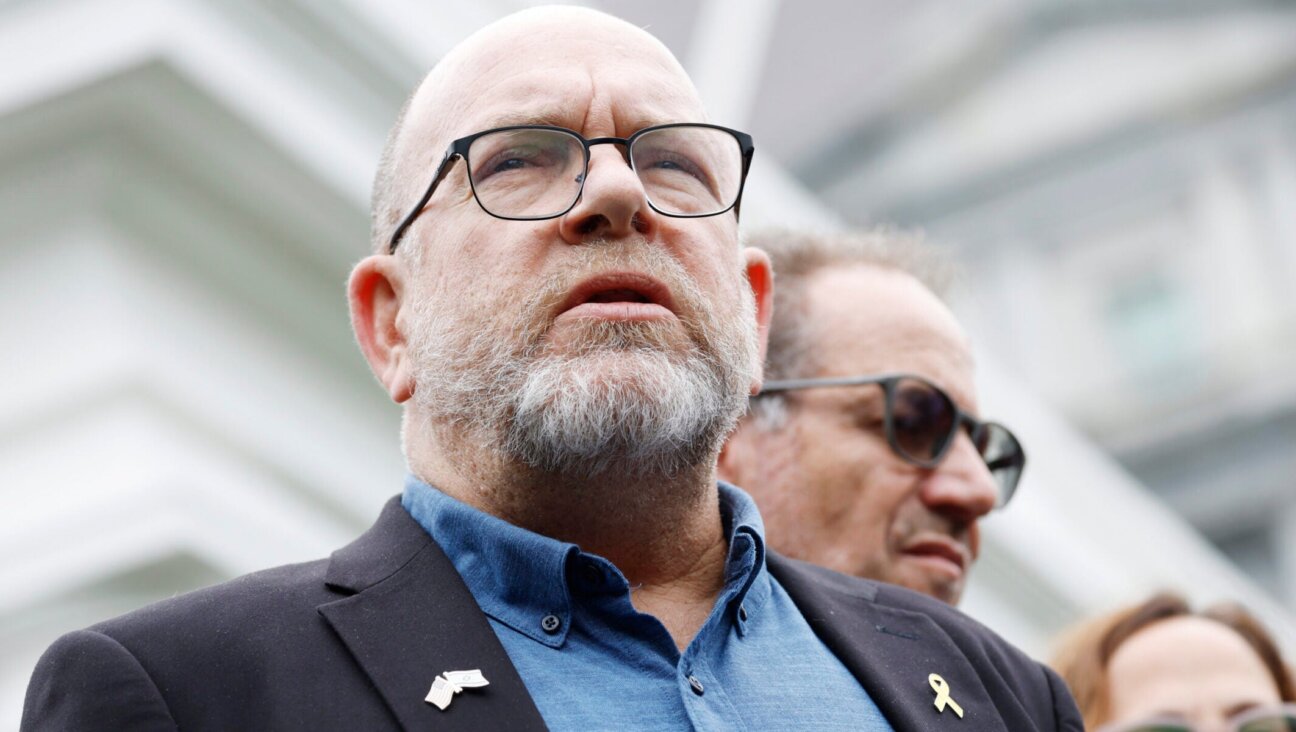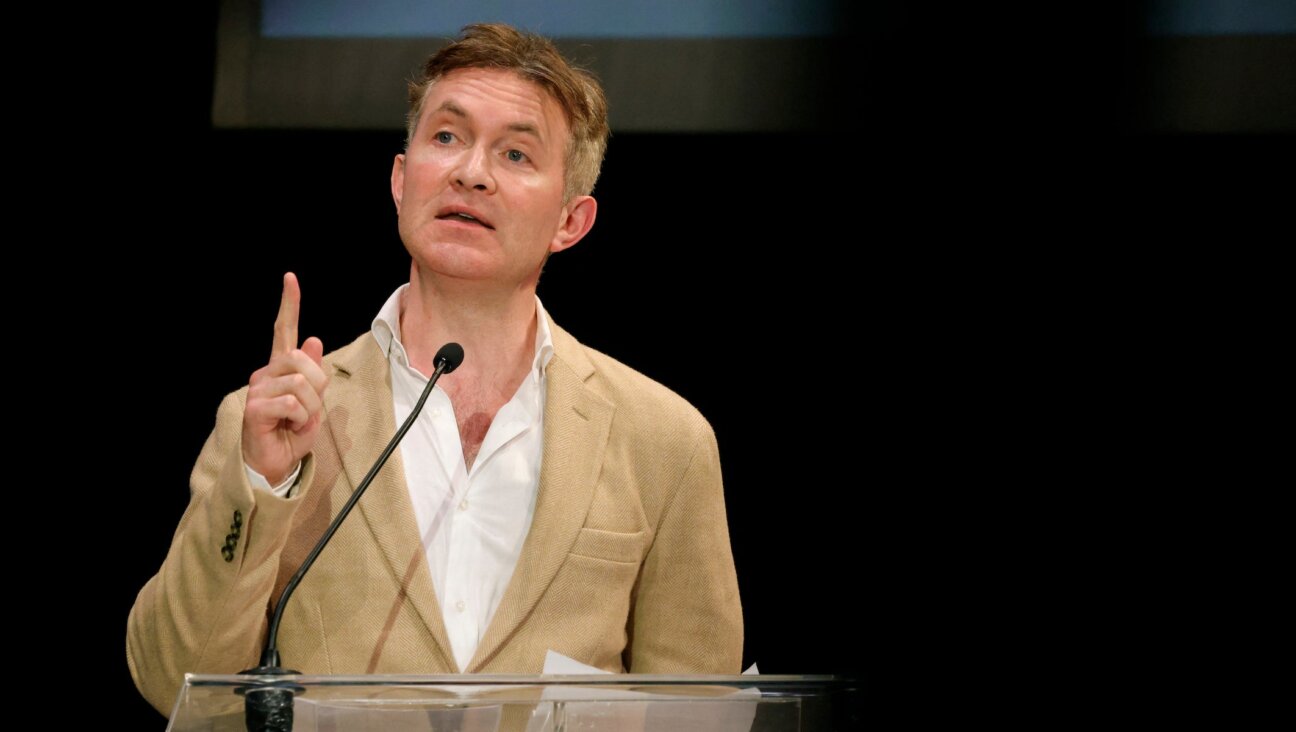New Faces of Israel’s Election

Fresh Face: Ex-news anchor Yair Lapid may not become the next Israeli prime minister. But he leads a crop of fresh faces contesting this month?s general election. Image by getty images
Israel’s January 22 general election looks unlikely to bring a change in who will be heading the government. But it does promise to shake up the Knesset by bringing a large, and in many cases controversial, cohort of new players into politics.
Among them are some hard-nosed ideologues whose likely ascension to Israel’s parliament is provoking consternation from their more moderate party leaders.
Prime Minister Benjamin Netanyahu’s nemesis inside his Likud party attained a realistic spot on its election slate after almost two decades of political maneuvering. The radical Moshe Feiglin told the Forward in a recent interview that Netanyahu is “a great pilot, flying nowhere” and pledged that he will become prime minister and push Likud further right. Labor, which leader Shelly Yachimovich is trying hard to present as centrist, has the outspoken leftist Merav Michaeli in its number-four spot.
Two so-called political princes — sons of renowned politicians — have launched their own political careers with this election. Yair Lapid is leading his new Yesh Atid party, and Yair Shamir, son of Israel’s seventh prime minister, Yitzhak Shamir, shunned his father’s Likud party to run for Yisrael Beiteinu, which positions itself to Likud’s right.
Competition for the Orthodox vote is fiercer than ever — and now, it isn’t just the religious parties pursuing religious voters. The Orthodox Feiglin is appealing to religious voters, Lapid made popular rabbi Shai Piron number two on his list, and the Tzipi Livni party has a well-known Orthodox former soldier, Elazar Stern, in its second spot.
In the Sephardi-Orthodox niche, Shas, too, has a new challenger — party rebel and Haredi iconoclast Haim Amsalem, who is leading his new Am Shalem party. Shas is fighting back with the return of its crowd-pleasing ex-convict former leader Arye Deri.
Just as non-Orthodox parties are hoping to attract religious voters, the religious Jewish Home party is branching out and trying to attract non-observant voters, aided by its first-ever secular candidate, Ayelet Shaked.
The election is being fought in the shadow of Israel’s social protests, and several prominent activists are expected to get the chance to take their battle from protests to parliament, among them Meretz’s Tamar Zandberg.
Together, these players are sure to make the Knesset an even more lively deliberative body than it already is — if that is possible. The Forward’s lowdown on some of these prospective new lawmakers makes clear why this is so.

Yair Shamir
YAIR SHAMIR
Yair Shamir, son of the late Yitzhak Shamir, is a star signing for Yisrael Beiteinu, a right-wing party originally founded by Avigdor Lieberman to speak for Russian immigrants. The party has fared well electorally on its ultra-nationalist credentials, especially its demand for loyalty from Arab citizens of Israel — a call that critics say has crossed the line to rabblerousing.
Since last election, however, Israel’s social protest movement has forced economic issues and the cost of living higher up on Israel’s political agenda. Shamir, 67, is Yisrael Beiteinu’s weapon for electioneering in this environment. He doesn’t buy into the ethos of the thousands who pitched protest tents in the summer of 2011 and called for a stronger welfare state. Instead, marshaling his credentials as one of Israel’s most successful businessmen, he promotes the free market as Israel’s best hope for reducing living costs. Big savings for normal Israelis will come from breaking up cartels that are dominant in the Israeli economy, Shamir says. He promises to strengthen the middle class.
Shamir’s management experience reads like a Who’s Who of big-name Israeli businesses, including El Al Israel Airlines, where he was chairman and overseer of the privatization process; the national food manufacturing giant Elite Food Industries, where he was CEO; and Israel Aerospace Industries, where he was chairman.
A staunch rightist, Shamir sees little point putting effort into making peace with the Palestinians. The ball is in their court to contact Israel if and when they are ready, he argues.
“It takes two to make peace but only one to reject it,” he told the Forward. “Unfortunately, I do not see much chance of moving the peace process forward. During the last two decades we have focused too much on what has been a failed process at the expense of pressing internal issues. I am glad that there is a refocus across the political spectrum toward internal issues.”
Following Beiteinu’s deal with Likud which has the parties running on a joint list — currently polling at 37 of the Knesset’s 120 seats — it looks almost certain that Shamir will take a prominent government role, probably as interior minister or housing minister.
YAIR LAPID
The social protests and association with a famous father set the stage for Yair Lapid, founder and head of the new, centrist Yesh Atid party.
The 49-year-old son of the late justice minister and Knesset member, Yosef Lapid, Yair Lapid entered politics in January after years as a widely respected television anchor, newspaper columnist, author, screenwriter and actor. Opinion polls predict that his party will win around eight of the Knesset’s 120 seats.
Lapid’s party gained its current popularity by promising to address the concerns raised in the 2011 tent protests, known as J14. These concerns include escalating housing costs and Israel’s high cost of living. His vows to improve education, health and transportation have attracted more politically centrist supporters than the Labor party, which also sees itself as the so-called J14 movement’s natural ally. Unlike Labor, Lapid proposes to increase efficiency rather than make far-reaching changes in the nation’s social welfare system.
Lapid strongly believes in drafting Haredim, or ultra-Orthodox Jews, and Arabs for military service. The two groups’ current exemption from serving was one of the key points of protest for many J14 demonstrators.
As for the Palestinian issue, Lapid advocates a two-state solution to the Israeli-Palestinian conflict but rejects what most consider one of its central planks, namely that Jerusalem will be shared and East Jerusalem will become the Palestinian capital. “We cannot blink on this issue,” he said in November. “When it comes to Jerusalem, there are no compromises.”

Amselam
HAIM AMSALEM
Haim Amsalem was the Shas politician who dared speak the unspeakable: Haredim should work and not rely on state funds. He also criticized the strict Haredi requirements for conversion to Judaism, and Haredi refusal to undertake national service.
The party expelled him two years ago for taking these positions. “There are only two ways to leave Shas,” he quipped some time afterwards. “Sit in jail or voice your own opinions.”
Amsalem set up his own party, Am Shalem — chosen to sound like his name but also because it means “Whole Nation.”
Amsalem, 53, describes himself as “a Jew, a Haredi and a Zionist.” In contrast to other Haredi politicians who avoid showing patriotism towards the State of Israel for ideological reasons, he calls it “our beloved state.”
He wants to take practical steps to integrate Haredim, currently one of Israel’s poorest populations, into the workforce. He suggests programs to employ them in high tech, as well as the establishment of an institution like New York’s Yeshiva University that will combine religious study with academic degrees.
Shmuel Sandler, a political scientist at Bar Ilan University and expert on religious politics, said that Amsalem is giving a voice to the “big revolution” that is taking place among Haredim, with many becoming more open to the idea of secular study.
Since the last elections, secular and religious citizens have clashed over ultra-Orthodox-favored moves such as attempting to implement gender segregation in public spaces. Amsalem publicly opposes such attempts.
Together with the positions that led to his expulsion from Shas, this has won him admirers outside the Haredi community. Haaretz’s economic affairs correspondent Nehemia Shtrasler crowned him “the most courageous man in Israel politics,” who brings a “breath of fresh air” to the scene. The latest polls indicate that enough voters agree, and likely will send him into Knesset along with two other candidates from his list.

Aryeh Deri
ARYEH DERI
Israel’s niche party for Jews from Arab countries, the Haredi-run Shas, is welcoming back one of the sector’s most popular figures. He’s a man so adored that he was ranked the 58th -greatest Israeli of all time in a 2005 national poll.
Aryeh Deri spent almost two years in jail for committing fraud and taking bribes while he was minister of the interior. But his absence only made the hearts of many Mizrachim, as Jews from the Middle East are known, grow fonder: They cried persecution by the Ashkenazi-dominated establishment against the man who established and built up Shas and who surprised the country with how strong the Mizrachi party had become.
Deri’s drive, charisma and flair for politics are evident from the fact that he became a minister at just 24 and minister of the interior at just 29. Now Deri, 53, is back as one of three leaders of Shas, the others being Eli Yishai and Ariel Attias.
Deri’s return has made up for the loss of supporters to Amsalem, with Shas looking set to keep its current 10 seats or perhaps even gain one. But it has significance beyond the Mizrachi vote.
Since Deri left Shas, it has become in many respects a hard-right party.
His successor, Yishai, famously declared war on African immigrants, accused them of being AIDS-ridden criminals, and threatened mass round-ups and imprisonment — though he lacked the government authorization to follow through. Deri is believed to want to drop Shas’s battle against asylum seekers.
Of even more significance to national politics, Deri, a dove during the Oslo process, is expected to throw Shas support behind any peace deal the next government may make with the Palestinians. By contrast, if Yishai alone headed the party, it would be expected to block it.
Tel Aviv University political scientist Ephraim Yaar, author of “Shas: The Haredi-Dovish Image in a Changing Reality,” commented: “Deri is a very shrewd bargainer and if he gets from the government enough concessions on things that matter to him most — religious matters and funding for yeshivot — he’ll go with the government [on a peace deal].”

Ayelet Shaked
AYELET SHAKED
Secular Tel Avivian Ayelet Shaked is the first non-religious candidate in the history of Israel’s main religious-Zionist faction — and the party hopes she will be its secret tool for stealing votes away from Likud.
Shaked’s election in Habayit Hayehudi’s November 13 primary was “a litmus test showing that the party is opening up and not staying a closed club for the religious,” Naftali Bennett, the party’s new leader, told the Forward.
Habayit Hayehudi, formerly the National Religious party, is trying hard to shake its image as a sectarian Orthodox party, hoping to attract secular and traditional Jews who normally vote for Likud. The pro-settler party is appealing especially to those who feel alienated from Likud by Netanyahu’s acceptance in principle of a Palestinian state since the last election. Habayit Hayehudi advocates boosting the Jewish character in the state and ruling out Palestinian statehood.
Bennett wants Habayit Hayehudi to usurp Likud over the next two decades, and polling is showing remarkable growth — it looks set to win about 13 seats, while it currently holds just five. Bennett was Netanyahu’s chief of staff from 2006 to 2008, when Shaked served as the prime minister’s bureau chief.
Shaked, 36, established the right-wing My Israel lobbying group with Bennett, and as chair has become a heroine of the Greater Israel-advocacy community. She has built up a following of 100,000 people who lobby against any manifestation of what she considers an affront on Zionism, either in Israel or abroad. One of her favorite targets is what she considers the leftist media.
She famously distributed shocking photographs of the bodies of the Fogels, a family killed by terrorists in the West Bank settlement of Itamar in March 2011. Many hasbarah activists — who support Israel through positive public relations outreach, or “explaining” — regarded the move as a stroke of genius, but some critics called it distasteful.
ELAZAR STERN
To his foes, he’s the Orthodox man who shamefully sold out his community. To his admirers, he’s one of the few people around who embody a moderate religious Zionism that is disappearing.
Elazar Stern holds the second spot on the Knesset candidates list for the new party headed by former Foreign Minister Tzipi Livni, which is polling at around nine seats. Stern was head of the Israeli military’s Human Resources Directorate in 2005, when Israel withdrew its settlements and army from Gaza. He played a key role in that withdrawal, in line with his position then. For this, members of the predominantly religious Zionist communities in the Gaza settlements pelted him and his family with stones and bags of water when they prayed at the Western Wall a few weeks later.
Stern is harshly critical of the direction that religious Zionism has taken. “Unfortunately the biggest mistake of religious Zionism in the last 40 years is that it pushed the question of Jewish identity aside for the question of where the border should go,” he told the Forward. This has had the effect of alienating non-Orthodox Jews who aren’t pro-settlement from Judaism, he said.
Stern wants Israel to allocate state funding to Reform and Conservative institutions, and to make state bodies concerned with religion more approachable for the non-observant.
Now 56, Stern was a career soldier from 1974 until 2008. In his role as the IDF’s human resources chief, he set up the program that allows soldiers who aren’t halachically Jewish to convert during their army service — a conversion track despised by Orthodox hard-liners. And he broke up many Orthodox-only units and integrated their soldiers into normal units.
Stern has a reputation as a man who speaks his mind even when it’s not popular — he was one of just a handful of public figures to openly oppose the deal to free Gilad Shalit due to concerns about releasing 1,027 Palestinian prisoners.
He rejects the international community’s view that settlements are illegal — they are rather part of “our homeland,” he says — but adds that he is prepared to make concessions for a peace deal. Nevertheless, he is “not sure we have a real partner.”
TAMAR ZANDBERG
A social protester who continued the fight long after it was out of the headlines, 36-year-old Tamar Zandberg is Meretz’s energetic new candidate.
The Tel Aviv city counselor led the local Meretz faction’s walkout from the ruling municipal coalition at the start of the summer, accusing Mayor Ron Huldai of trying to undermine the social protest movement. Huldai refused to let protestors pitch tents as they had been allowed to the previous summer. In June, when police arrested 85 people who were accused of violent protest, Zandberg said it was part of a Huldai-led move to discredit the cause.
Zandberg, a prominent activist from the first days of the social protests, is also known for taking to the streets over the Palestinian cause. She was one of the organizers of “Yes Palestine” rallies in Tel Aviv in support of the Palestinian statehood bid at the United Nations in September 2011, and again in November. The UN bids are the “most peaceful and sure way” for the Palestinians to promote their desire for statehood, she said. She added that advancing this cause was also a “sure way to guarantee the continuation of Israel as a state,” by which she meant Israel as a democratic state with a strong Jewish majority.
In local Tel Aviv politics, Zandberg has been active against what she terms religious coercion, placing the issue of buses on Sabbath on the city council’s agenda. Her advocacy moved the council to demand that Huldai’s administration allow Sabbath buses in the city. That request now lies with the government, which has yet to respond.
Her position on Sabbath buses angered Haredim, but on the issue of the military draft she agrees with many of them. Unlike most secular politicians, Zandberg favors continuing their exemption from service if they can be integrated into the workforce without drafting them. “I don’t think they’re needed to go in the army if the problem [of low participation in the workforce] is solved,” she said.
Polls suggest that Zandberg, in the sixth spot on Meretz’s list, may just miss out on a Knesset seat, but following the release in late December of its new diplomatic platform and peace plan, some analysts expect a surge in support from leftist Labor voters.

Moshe Feiglin
MOSHE FEIGLIN
In Likud’s party primary prior to the last election in 2009, far-rightist Moshe Feiglin scored 20th on the party’s candidate roster. But party leader Benjamin Netanyahu had him demoted by the Likud elections committee to slot 36, keeping him out of the Knesset. This time around, Feiglin is 15th on the Likud list, and the party’s shift to the right has made demotion out of the question. This time, Feiglin looks almost certain to become a lawmaker.
Feiglin’s expected ascension is the payoff for 18 years of planning. He launched his political career by calling for mass civil disobedience to protest the Oslo peace process in the mid-1990s. He founded his own movement, Zo Artzeinu, in 1994, which became Manhigut Yehudit in 1996. The idea was to establish a radical faction inside Likud to push the party to the right. Now, if all goes as expected, he will be able to will be able to do this from inside the Knesset.
Feiglin wants to annex the West Bank, stop all foreign aid, and offer Palestinians — who would have residency but not citizenship under his annexation plan — cash incentives to emigrate.
Feiglin, 51, told the Forward that he won’t be making any compromises once he’s in the Knesset. “The reason it has taken me so long to get to Knesset is that I’m an individual who sticks to his principles, and I’ll continue to be this way … I’m not going to Knesset just to warm a seat.”
Feiglin is bringing a more religious agenda to Likud than ever seen in the past. He wants Israel to strongly state a religious claim over the entire biblical Land of Israel. One of his highest-profile campaign-time activities has been leading communal prayer on Temple Mount. This is thought to be a first — Israel Police maintains that this isn’t permitted under the status quo agreement that gives the Muslim Waqf control over the site, and has detained him in the past for trying to pray communally there.

Merav Michaeli
MERAV MICHAELI
Just as Feiglin will be hoping to push Likud to the right, feminist journalist Merav Michaeli, who surprised observers by standing in the Labor primaries, is hoping to push her party to the left.
Party leader Shelly Yachimovich has given the 46-year-old a cold welcome to the party and avoided appearing in public with her. With an eye on the polls, which predict Labor’s growth from eight seats to almost 20, the party has been keen to strike a center-left image, and apparently feels that Michaeli’s ideological brazenness is unhelpful.
Yachimovich tends to stay quiet on the Palestinian issue, steering her campaign to social issues. But Michaeli is rarely quiet on Palestinians. “We don’t understand that cutting Palestinians off from water supplies, destroying their homes and villages, and repressing them in so many different ways for so many long years is also part of our history,” she wrote in Haaretz in August. “All of these are part of our story, no less than they are part of the story of the Palestinians.”
She strongly advocates an Israeli-Palestinian peace deal that involves far-reaching concessions by Israel and fiercely criticizes settlements. On the domestic front, she opposes privatization of government-owned companies and champions traditional left-wing causes.
Michaeli says that she is driven by her feminism. “The American feminist Gloria Steinem wrote that a woman can either be a feminist or a masochist,” she stated in November in an article explaining her decision to join Labor. “Feminism is political and political issues are the forces at work in society and in the state, the use that is made of them and the division of power. Politics is the balance of power. Economics, health, religion, law, sex, children and even the double bed are all political issues.”
Contact Nathan Jeffay at [email protected]
















